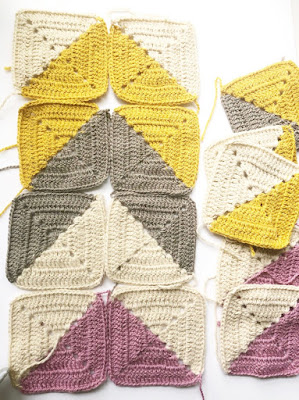‘Kōsetsu’ is Japanese for ‘snowfall’ and with Sapporo receiving the most snow on the planet (485 cm /191 inches per year!) it seemed an appropriate name for this shrug, which will keep you cosy in the coldest of winters.
When Stylecraft asked me to design something with one of their yarns, I knew I wanted to use Cosy Delight. It's a chunky-weight yarn (my favourite yarn weight), but as the fibres are manufactured using a jet air process, this yarn is as light as air AND toasty warm, too.
Now, sometimes when I've worked with chunky-weight yarns, their weight and bulk means that they're not always suitable for garments, but this yarn is very different and I have to say, I was very impressed when I worked with it.
Firstly, it frogs like a dream, which is particularly important for me as a designer, especially when I need to be trying out a few stitches or rows and have to adjust stitches. Often with fluffy yarns, the fibres stick together and the yarn stretches and breaks when any attempt to rectify mistakes is made (mohair nightmares, anyone?). However, this doesn't happen with Cosy Delight and I could pull back the stitches confidently, without worrying any adverse effects.
Then there's the colour range: simple, stylish and perfect for the winter. I chose the cream because I wanted it to go with everything, but it would look equally lovely in any of the shades.
Here's the yarn details:
Composition: 76% Acrylic, 24% Polyamide
Ball Weight: 100g
Yardage/Meterage: 240 yds/ 220 m
Hook Size: 6 - 7 mm
Tension: 14 stitches x 20 rows to 10 cm square
Wash Care: Machine Wash at 30 Degrees C, Cool Tumble Dry, May Dry Clean, Do not Iron
RRP: around £3.99
If you join the Stylecraft Make-Along group on Facebook, you'll be able to find a special discount code off the patterns in my shop and you'll be able to share your projects with the team!
Buy the pattern here.
Enjoy making and stay warm!!
Sarah xx


























